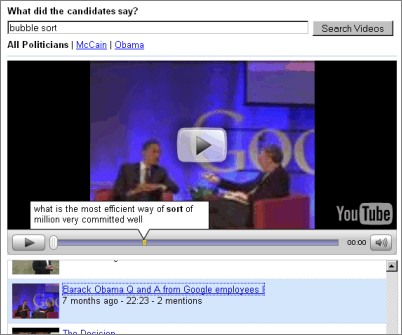
Google released a well-working iGoogle gadget in which they extract text information from video content. The Elections Video Search gadget – its standalone page can be accessed as well – lets you search for keywords across YouTube’s US politician channels, like Barack Obama’s. Clicking on a result item will load the video in question into the player embedded in the widget, with the specific occurrences of the word in the video color-marked on the timeline.
For instance, I searched for the word friendship and got a result titled “Obama Anniversary of Israeli Independence”. Moving the time bar line towards one of the yellow markers, I’m hearing Obama say, “... let us renew the friendship between our nations ...”. Another search for bubble sort returns a quip from a Q&A Obama held at the Google headquarters, where Obama is answering a programming question.
While the hits returned look precisely correct, hovering over the yellow marker pops up a snippet which shows Google doesn’t get it completely right... like when they transcribe a piece as “... to recognize Israel and are fighting for friendship wolf they ...”. Google admits as much in their blog post on this service, saying snippets “may not be 100% accurate”. They add that speech recognition “is a difficult problem that hasn’t yet been completely solved”.
This gadget shows that using speech-to-text technology, even when it’s very limited in scope right now, is a highly useful feature for video search. If and when Google ever rolls this out for all video content they indexed (or perhaps just for their YouTube content for starters), it could become an extremely interesting research tool. Besides just aiding search, extracting textual content from videos could also be used by Google to ...:
- display related videos based on text content, even if that content is not available in the video’s text, description or tags
- show other videos which contain the same quote, like a movie referenced in another movie
- display more context-aware advertisement on places like YouTube
- offer full textual transcripts of videos for easy, accessible copying (the quality of transcriptions must be higher for this than for the typical needs of search)
- add PageRank to URLs being talked about
- offer automated captions in a video
- offer automated translated captions in a video, as Google is also doing work in statistical machine translation (and if you go a step beyond, text-to-speech technology in the future could even read the auto-translated transcription back to the user, delivering dubbing of videos)




